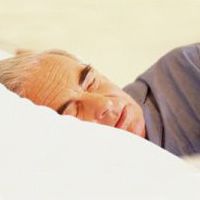Article
Testosterone Replacement Therapy Improves Nocturia in Hypogonadal Men
Author(s):
Results from a Japanese study show that testosterone replacement therapy may improve nocturia, sleep conditions, and quality of life among men with hypogonadism and nocturia.

A new analysis of a Japanese study finds that testosterone replacement therapy may combat nocturia in hypogonadal men.
Researchers looked through patient records from the EARTH study and found that 64 men began the trial with a clinical diagnosis of nocturia. Of those, 31 were in treatment arm of the 6-month study and thus received 250 mg of testosterone enanthate via intramuscular injection every 4 to 6 weeks. The other 33 were in the placebo arm of the study and thus received no testosterone.
All patients in the study, including all of those with nocturia, filled out a Short Form-36 health survey at baseline and at 6 months, along with the questionnaires needed to calculate International Prostate Symptoms Scores (IPSS) and Aging Male Symptoms (AMS) scores.
All 64 of the men typically got up 2 or more times per night to urinate when the study began. The study period saw no significant improvement in control group patients, but the 31 men who received testosterone injections did see significant improvement as measured by their responses to IPSS question number 7 and AMS question number 4.
The first of those questions asks men specifically how many times they typically get up per night to urinate. The second question asks men to rate “Sleep problems (difficulty falling asleep, difficulty in sleeping through the night, waking up early, feeling tired, poor sleep, sleeplessness)” on a scale that ranges from 1 (none) to 5 (extremely severe).
The research team noted several potential limitations in their study, including both its retrospective nature and its relatively small sample size. Still, within the sample they study, the effects were significant enough to warrant further investigation.
“Six-month testosterone replacement therapy may improve nocturia, sleep conditions and quality of life among men with hypogonadism and nocturia,” the study authors wrote in The Aging Male.
Nocturia is common in older people of both sexes. Indeed, a 2003 poll conducted by the National Sleep Foundation reported that 65% of all adults between the ages of 55 and 84 typically suffer from it at least a few nights per week.
The condition can stem from a number of different causes that range from diabetes to a simple tendency to drink a lot of liquid right before bed.
Previous studies linked testosterone levels and nocturia. A 2011 paper from Urology, for example, compared testosterone levels and IPSS totals in 509 men whose average age was 58 years. After adjusting for age, hypertension, diabetes, and total prostate volume, the researchers found that total testosterone levels were not associated with IPSS question scores, except on question 7. Men with total testosterone levels in the highest quartile were 44% less likely to suffer nocturia than men with total testosterone levels in the lowest quartile (p=0.037).
The new Japanese study may be the first evidence that treating hypogonadism can reduce nocturia but there is some older evidence that treating nocturia can reduce hypogonadism. A 2014 paper in Urology reported on a study that provided 0.1 mg of desmopressin per day for 12 weeks to 62 men who had been diagnosed with nocturia. Among men who began the study with total testosterone levels under 3.5 ng/mL, average testosterone levels rose from 2.85 ± 0.58 ng/dL to 3.97 ± 1.44 ng/dL (p=0.001).




